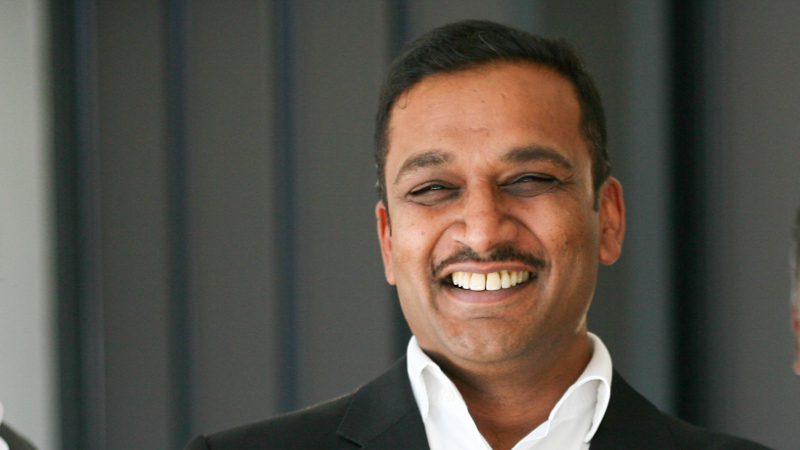AI isn’t coming. It’s already at your desk. And if you’re South African, chances are you’re ready to hit the ground running. A brand-new…
Former Fo-Sho CEO still smiling, despite over R8m investors lost when startup shut down [Updated]

UPDATE (24 October): Constantia CEO Volker von Widdern told Ventureburn subsequent to the publication of this story that the insurance company had taken the decision to stop underwriting the startup because the startup’s model had not proven viable. He also pointed out that while Constantia had made losses in some areas, this had nothing to do with why the relationship was ended. The company had doubled revenue from R1-billion to R2-billion between 2016 and 2018 and is on track to grow 20% this year, he said. The story has been updated accordingly.
Investors and shareholders may have lost R8.5-million that they had invested in SA insurtech Fo-Sho when the co-founders shut the business down in February, but the startup’s former CEO Avi Naidoo is not letting it get him down.
The Joburg-based startup was founded in 2016 by Naidoo (pictured above), Mithun Kalan and Siva Moodley. Moodley subsequently left last year to pursue another startup in the fintech sector.
In December, just months before the business shut down, Naidoo said the startup had plans to expand the firm’s customer offering and to get an office in Botswana up and running.
Speaking to Ventureburn today after the publication called him when a weblink to the startup’s website was being redirected to another domain name, Naidoo said the startup was forced to shut down after its underwriter, Constantia, decided to withdraw its backing in October last year “for strategic reasons”.
Fo-Sho was forced to close down after its underwriter Constantia withdrew its backing
Naidoo explained that Constantia had just reported ‘big losses’ and as such the board was not keen to continue backing the insurtech and had taken a decision to return to its traditional broker-driven model.
‘Their model wasn’t viable’
But Constantia CEO Volker von Widdern however said the insurance company had taken the decision to stop underwriting the startup (one of three the company has been involved in) because the startup’s model had not proven viable.
This, while Constantia had made underwriting losses on the startup’s portfolio, after spending several hundred thousand rands on project fees to help the startup up and running, he said.
He also pointed out that while Constantia had made losses in some areas, this had “absolutely nothing” to do with why the relationship was ended.
He said Constantia had doubled revenue from R1-billion to R2-billion between 2016 and 2018 and is on track to grow 20% this year.
‘We really tried our best’
In terms of insurance regulations the startup had three months in which to looking for new underwriters.
The startup had 860 customers when Constantia decided to withdraw its support. Of these, 550 were on one book managed by a single broker. The broker immediately moved them to the previous insurance company they were dealing with.
The remaining 300 customers were all sourced via the startup’s app. Many of these clung on until February this year.
Naidoo says the startup made approaches to several other insurance companies to take over underwriting the company. However, he said they all indicated that while they were keen, it would take closer to a year to onboard the startup with their systems.
“We really tried our best, but circumstances didn’t go in our favour,” he said.
At the time when Constantia announced it would be withdrawing its underwriting backing, the startup had broken even in terms of covering its monthly costs, but had yet to reach a point of comfort in terms of being able to settle claims and remain a going concern.
“We were covering our costs, but in terms of reserves we were almost at a point where we could pay (all) claims from reserves,” he explained
He said the target had been to reach 1000 users. “We thought we could break even in nine months (nine months from November 2018 — Ed),” he said.
But Von Wittern disputed Naidoo’s contention that the startup had hit “break-even point” with premium payments alone, before it shut and argued that Fo-Sho would not have been viable with just 1000 users because the startup’s premiums were so low.
‘R3m of R8m lost, was our own money’
He confirmed that of the R8.5-million, he and Kalan and Moodley had put in R3-million in cash of their own money.
He said while the losses totalled R8.5-million it could have been more, as not all the investment from investors had been injected into the business — as the investments had been made in tranches contingent on the startup meeting certain targets.
One of the largest investments came from BEE investor and Alpha Vista Systems director Dempsey Naidoo (no relation). Fo-Sho’s Naidoo did not disclose the exact amount of the investment, saying only at the time that it was a “multi-million rand venture capital investment”.
Another of the investors that lost R5.5-million were Startupbootcamp (SBC) Afritech which had an eight percent stake in the startup. The startup was part of the accelerator’s first cohort.
“The SBC guys were really helpful, as they said ‘these things happen’ and tried to help salvage things,” said Naidoo.
He pointed out that all the debts of the business were paid when the company was liquidated and that he and his partners do not still owe anything to anyone.
Working on new AI insurance POC
But the entrepreneur hasn’t quite thrown in the towel.
While Kalan is doing consulting work, Naidoo and three other partners are now reworking Fo-Sho’s algorithm to develop an artificial intelligence (AI) powered insurance product for a local investment house.
The investment house is spending tens of millions (Naidoo declined to go on record on how big the sum is) helping the four — who have set up a special purpose vehicle (SPV) — to bankroll the development of a proof of concept (POC).
Naidoo said the four had not come up with a name for their SPV as yet. He said it would be up to the investment house to assist with logos, names and branding.
“In hindsight we chose the wrong partner,” said Naidoo. “There’s massive learnings I’ve made. So, it’s not all bad.”
Featured image: Former Fo-Sho founder and CEO Avi Naidoo (Supplied)

